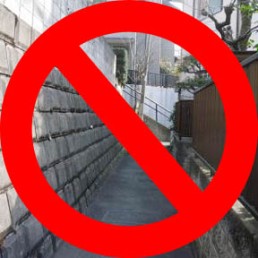Buying secondhand properties in Japan's deflationary environment
On March 22, the 2012 Koji-Chika assessed land values were announced. While the average land value had fallen for the fourth year in a row following the Lehman Shock, the rate of the fall had reduced slightly.
The MLIT reported that the 2011 Tohoku disaster caused the real estate market to stall temporarily, but indicated that there are signs we are in the early stages of a market recovery.Read more
Real estate brokerage fees in Japan

When renting or buying a property in Japan you may have to pay brokerage fees, or agent fees, to your real estate agent. The brokerage fees are defined under the Real Estate Transaction Business Law. Under this law, real estate agents cannot charge fees in excess of those specified.Read more
Buying a house that cannot be rebuilt
Due to land and construction laws in Japan, there are some houses that legally cannot be rebuilt. This is an important point to watch out for when you are looking to buy a home and land.
These types of properties are called "sai-kenchiku fuka" which means reconstruction is not allowed. In many cases this is because the particular block of land does not have sufficient street frontage.Read more
Building Regulations in Japan
The following is a brief guide to some of the building regulations you will encounter when building a house in Japan.
Yosekiritsu
This is the building volume-to-land ratio and defines the maximum total floorspace allowed on a block of land. The ratio is expressed as a percentage, eg. 200%. In built-up areas in central Tokyo the Yosekiritsu is high, whereas in suburban and rural areas, the Yosekiritsu will be much smaller. The highest ratio in Tokyo is 1300% which applies to commercial land in the Yurakucho / Marunouchi area around Tokyo Station. Even still, there are buildings that exceed this ratio because they have borrowed air rights from neighboring blocks. Read more
Buying or renting a 'jiko bukken' in Japan
A "jiko bukken" is a property where the former occupant died of unnatural causes, such as suicide, murder, fire or neglect. They can be rented or purchased at very low prices, provided you are okay with the 'history' of the home or apartment. There are a growing number of individuals and companies that specialize in purchasing these properties at huge discounts, and either renting them out of re-selling in the future. In the case of a house, the house may be demolished and the land re-sold.Read more
Is 2012 the time to buy?
Good news for those waiting to buy an apartment. From next year, the inventory of unsold apartments is expected to reach high levels, which could result in more bargain buys.
According to the Real Estate Economic Institute, the sales contract rate for new apartments in September, 2011, had rebounded to 78%. In actuality, that degree of sales may not actually be true. The president of Attractors Lab said that the 'sales contract rate' is not entirely accurate because it does not include apartments that were held back from being released for sale.
In January, 2011, the Institute forecast an inventory of 50,000 apartments for the year. However, this was later reduced to an estimate of 45,000 apartments. The impact of the March 11 Tohoku disaster led many developers to delay apartment sales. By September, the actual supply was down to 28,000 units. Read more
What is the current market value of an apartment in Tokyo?
Real estate research and marketing company, Attractors Lab, have collected data from apartment sales in greater Tokyo and have made this data available for free through their new site called Sumai Surfing (www.sumai-surfin.com). Through the website, users can view the average apartment selling price when brand new and the current market price. Registered users are also able to view past sales history. Using the collected data, the current market value for almost any apartment can be estimated.Read more

